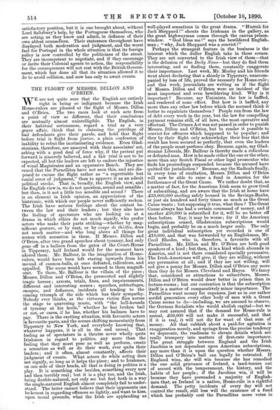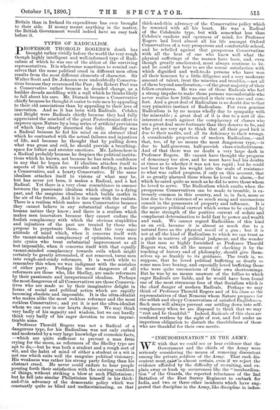THE FLIGHT OF MESSRS. DILLON AND O'BRIEN.
WE are not quite sure that the English are entirely right in being so indignant because the Irish Home-rulers are pleased at the flight of Messrs. Dillon and O'Brien. The two races look at such acts from a point of view so different, that their conclusions are mutually almost unintelligible. The English, in their habitual seriousness, regard a trial as a very grave affair, think that in claiming the privilege of bail defendants give their parole, and hold that ffight before trial is flight from justice, a plain confession of inability to rebut the incriminating evidence. Even Glad- stonians, therefore, are annoyed with their associates' act, asking with a good deal of force why, if the is put forward is sincerely believed, and a fair trial rs not to be expected, all but the leaders are left to endure the injustice of venal Magistrates and an oppressive Bench. They are vexed that the Parnellites have not seen this, and are dis- posed to excuse the flight rather as "a regrettable but venial error of judgment," than to approve it as an adroit political stroke. That is, broadly, the English view, and the English view is, we do not question, sound and sensible ; but then, is it not a little too sensible and sound ? There is an element in Irish opinion, an appreciation of the histrionic, with which our people never sufficiently reckon. The Irish have serious feelings about the contest be- tween the law and their leaders ; but they also have the feeling of spectators who are looking on at a drama in which ethics do not much signify, who prefer actors who make their parts striking—whether by mag- nificent gesture, or by rant, or by coups de th,edtre, does not much matter—and who long above all things for scenes with sensation in them. If Messrs. Dillon and O'Brien, after two grand speeches about tyranny, had only gone off in a balloon from the gates of the Court-House in Tipperary, half Ireland would for the moment have adored them. Mr. Balfour, in the imagination of Home- rulers, would have been left staring upwards from his mound of cannon-balls, at once defeated, ridiculous, and appalled. The scene would. have seemed to them magnifi- cent. To them, Mr. Balfour is the villain of the piece ; Messrs. Dillon and O'Brien, the persecuted and slightly tragic heroes ; arrests, trials, fines, and imprisonments, different and interesting scenes ; speeches, subterfuges, escapes, and defiances, incidents all tending to the coming triumph of the side which has their sympathy. Nobody ever thinks, as the virtuous victim flies across the stage to quavering music, with "the hell-hounds of tyranny at his heels," whether he has broken bail or not, or cares, if he has, whether his bailmen have to pay. There is the exciting situation, with favourite actors in favourite parts, and the scenes shifting momentarily from Tipperary to New York, and everybody knowing that, whatever happens, it is all in the end. unreal. That feeling as of spectators in a theatre never wholly quits Irishmen in regard to politics, any more than the feeling that they must pose as well as perform, create a sensation as well as do their work, ever quits their leaders ; and it often almost constantly, affects their judgment of events. !What actors do while acting does not signify, so long as it helps the piece; and to Irishmen, on one side of their heads, all that is doing in politics is a play. It is something else besides, something every now and then terribly real; but it is a play too, and the Irish, being double-natured, not only see but feel both in a way the single-natured English almost completely fail to under- stand. The latter cannot believe that their opponents can be honest in regarding offences so lightly, and want to hiss, upon moral grounds, what the Irish are applauding as well-played sensations in the great drama. "Hurrah for Jack Sheppard !" shouts the Irishman in the gallery, as the great highwayman comes through the canvas prison- window. "God bless me !" says the bewildered English man ; "why, Jack Sheppard was a convict !" Perhaps the strangest feature in the business is the interest which the duller English take in these scenes. They are not converted to the Irish view of them—that is the delusion of the Daily News—but they do find them interesting, and so finding them, constantly exaggerate their importance. Last week, Mr. Morley and his friends went about declaring that a shindy in Tipperary, unaccom- panied by loss of life, proved the necessity for Home-rule ; and this week, journalists are writing as if the flight of Messrs. Dillon and O'Brien were an incident of the most important and even bewildering kind. Why is it important? Because, say Unionists, the law is baffled, and, rendered of none effect. But how is it baffled, any more than any other law before which the accused think it better to expatriate themselves ? People run from the law of debt every week in the year, but the law for compelling payment remains still, of all laws, the most operative and effectual. The Crimes Act was not passed in order to punish Messrs. Dillon and O'Brien, but to render it possible to convict for offences which happened to be popular; and they by their flight only acknowledge their fear that this result has been secured so perfectly, that even the leaders of the people must perforce obey. Because, again, say Glad- stonian Liberals, Mr. Balfour is thereby made a ridiculous or defeated man. How is he made either the one or the other, more than any Scotch Fiscal or other legal prosecutor who finds his proceedings suspended because the accused have quitted the jurisdiction ? Because, say the Radicals finally, in every tone of exultation, Messrs. Dillon and O'Brien will now be able to raise a fund in America for the furtherance of the Great Cause. We rather doubt that, as a matter of fact, for the American Irish seem to grow tired of subscribing, and are aware that the Irish at home have £33,000,000 sterling safely housed in the Savings-Banks, or just six hundred and forty times as much as the Great Cause wants ; but supposing it true, what then ? The Great Cause always has had a certain command of money, and if another £50,000 is subscribed for it, will be no better off than before. Nay, it may be worse ; for if the American subscriptions ceased, Gladstonian subscriptions would begin, and probably be on a much larger scale. The only great individual subscription yet recorded is one of £10,000, and that was forwarded by an Englishman, Mr. Cecil Rhodes, who is, therefore, a favourite with all Parnellites. Mr. Dillon and Mr. O'Brien are both good speakers of a kind ; but then, it is a kind which abounds in America, and is not there considered specially persuasive. The Irish-Americans will give, if they are willing, without any persuasion at all ; and if they are not willing, will not give a penny for Messrs. Dillon and O'Brien any more than they do for Messrs. Cleveland and Hayes. We fancy that, considered as attractions to subscribers, Messrs. Dillon and O'Brien would draw better in prison than in lecture-rooms ; but our contention is that the subscription itself is a matter of comparatively minor importance. The Parnellites want money for expenses, just as in our rather sordid generation every other body of men with a Great Cause seems to do—including, we are amused to observe, the German Socialists who would, abolish capital—but we may rest assured that if the demand for Home-rule is unreal, £50,000 will not make it successful, and that if it is real, it will not die for want of that sum of money. All that rubbish about a paid-for agitation is exaggeration merely, and springs from the precise tendency we deprecate, the readiness to elevate details which are really trumpery into matters of first-rate importance. The great struggle between England and the Irish Jacobins is not dependent upon American subscriptions, any more than it is upon the question whether Messrs. Dillon and O'Brien's bail can legally be estreated. If England wins, she will win because she has remedied the one solid grievance of Ireland, a land-tenure out of accord with the temperament, the history, and the habits of her people ; if the Jacobins win, it will be because they have persuaded a majority of English- men that, as Ireland is a nation, Home-rule is a rightful demand. The petty incidents of every day will not control the result, still less will the existence of a fund which has probably cost the Parnellites more votes in Britain than in Ireland its expenditure has ever brought to their side. If money meant anything in the matter, the British Government would indeed have an easy task before it.







































 Previous page
Previous page